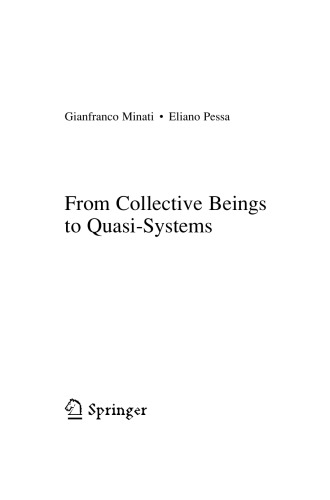Product desciption
From Collective Beings To Quasisystems Gianfranco Minati Eliano Pessa by Gianfranco Minati, Eliano Pessa 9781493975792, 9781493975815, 149397579X, 1493975811 instant download after payment.
This book outlines a possible future theoretical perspective for systemics, its conceptual morphology and landscape while the Good-Old-Fashioned-Systemics (GOFS) era is still under way. The change from GOFS to future systemics can be represented, as shown in the book title, by the conceptual change from Collective Beings to Quasi-systems. With the current advancements, problems and approaches occurring in contemporary science, systemics are moving beyond the traditional frameworks used in the past. From Collective Beings to Coherent Quasi-Systems outlines a conceptual morphology and landscape for a new theoretical perspective for systemics introducing the concept of Quasi-systems. Advances in domains such as theoretical physics, philosophy of science, cell biology, neuroscience, experimental economics, network science and many others offer new concepts and technical tools to support the creation of a fully transdisciplinary General Theory of Change. This circumstance requires a deep reformulation of systemics, without forgetting the achievements of established conventions. The book is divided into two parts. Part I, examines classic systemic issues from new theoretical perspectives and approaches. A new general unified framework is introduced to help deal with topics such as dynamic structural coherence and Quasi-systems. This new theoretical framework is compared and contrasted with the traditional approaches. Part II focuses on the process of translation into social culture of the theoretical principles, models and approaches introduced in Part I. This translation is urgent in post-industrial societies where emergent processes and problems are still dealt with by using the classical or non-systemic knowledge of the industrial phase.
Gianfranco Minati, Mathematician, Founder and president of the Italian Systems Society (AIRS); Doctoral lecturer at the Polytechnic of Milan; Member of the scientific committee of Conferences and Systems Societies. He is author of 32 chapters in books; editor of 7 books and journals; author or co-author of 15 books; author of 30 articles and of academic publications. His current research interest focuses on 1) Modelling processes of emergence by using Meta-Structures; 2) the emerging of a post-Bertalanffy Systemics; 3) the Dynamic Usage of Models (DYSAM), Logical Openness; 4) Architecture and Design as the design of social meta-structures to influence processes of emergence in social systems.
Eliano Pessa, Theoretical Physicist, is actually Full Professor of General Psychology and Cognitive Modeling at the University of Pavia, Italy. He has already been Dean of the Department of Psychology and of the Inter-departmental Research Center on Cognitive Science in the same university. In the past he has been Associate Professor of Artificial Intelligence at the University of Rome “La Sapienza”, Faculty of Psychology. He is author or co-author of 10 books and of a large number of papers on scientific journals, books, proceedings of international conferences. His scientific research interests include: quantum theories of brain operation, computational neuroscience, artificial neural networks, models of emergence processes, quantum field theory, models of phase transitions in condensed matter, models of human memory and visual perception, models of decision making, models of statistical reasoning.


